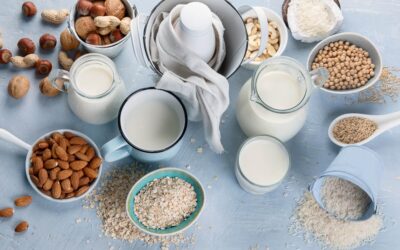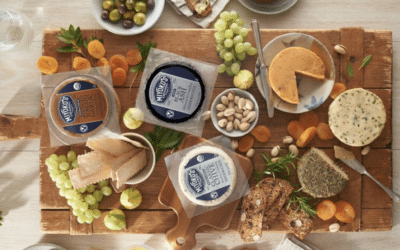In light of the ongoing global health concerns, wellness is top of mind for people around the world. While one should never disregard their health, it is now more critical than ever to ensure we take care of ourselves and our loved ones. Our bodies are naturally equipped to fight off disease, and while no one is invincible, we can significantly lower our risk of infection by strengthening our immune system. At times like these—when our travel is impacted, major events are canceled, and the news fails to offer any glimmer of hope—it can seem like we don’t have any control. But we do. We can choose what goes into our bodies, and we have the power to protect ourselves in this way. Keep reading to learn how you can take control, strengthen your immune system, and remain strong and healthy through these uncertain times.
How to Build a Strong Immune System
Humans are not defenseless. Our bodies are naturally equipped with a complex and powerful immune system to fend off disease. Both to its credit and detriment, our immune system can be compromised depending on one’s lifestyle. Treat your body right, and you can give your cells a fighting chance of fending off infections. Here are five basic steps to strengthen your system:
- Eat a varied, plant-based, and dairy-free diet
- Don’t smoke
- Exercise regularly
- Practice stress management
- Get enough sleep
We get it—all of these are common sense practices that should be incorporated into any healthy lifestyle, but that’s the key: a healthy lifestyle. The immune system is based on the constant creation and death of cells. When we keep these cells in a steady state of health, we can take charge and defend our bodies to the best of our ability.
Dr. Angie Sadeghi, our Switch4Good resident gastroenterologist, confirms, “COVID-19 has been one of the most devastating zoonotic infections in the history of the United States. If there is a lesson from the recent past, be it SARS, COVID-19, or any other viral infections which don’t respond to antibiotics, it is that these outbreaks should be treated proactively by focusing on prevention rather than treatment.”
According to Dr. Michael Klaper, “When we are stressed or anxious, we release the hormone cortisol and this makes it much harder for the lymphocytes to put out antibodies to fight a virus, illness, or bacteria.” So as much as you can, take a deep breath, pause for a moment, and let any unnecessary stress slip away. We’re going to get through this, and no doubt develop a stronger appreciation for the little things in life. Get outside, practice basic yoga, and keep up (digital) communication with loved ones to help with stress management.
Food and the Immune System
Professors at Harvard School of Public Health have noted that those who are malnourished—even micronutrient malnourished—tend to be more prone to disease. Those in developing countries and the elderly tend to be most at risk, as these two populations either don’t get enough food or decrease the variety in their diets, but young, affluent, and seemingly healthy people can also experience micronutrient malnourishment. To function at full capacity, cells need the essential nutrients—not just carbs, proteins, and fats, but vitamins A-K, magnesium, potassium, iron, calcium, boron, and more.
The Standard American Diet—along with popular diet trends such as Keto and Paleo—relies on foods such as meat and dairy that are severely lacking in these micronutrients. Plant-based foods, on the other hand, tend to be extremely high in these essential nutrients that support healthy cell function. Think of it this way: when one consumes a dairy product, such as cows’ milk, they are likely opting out of a more nutrient-dense option, such as pea milk.
While it’s true dairy does contain some nutrients—mainly calcium, protein, potassium, and fortified vitamin D—it also contains harmful trans and saturated fats, artery-constricting cholesterol, natural bovine hormones that may stimulate unregulated cell growth (increasing the risk for hormone-dependent cancers), and inflammatory properties. When there are ample amounts of foods that offer the same nutrients without the harmful side effects, there is no reason to consume dairy for the sake of meeting nutrition needs.
Foods That Support a Strong Immune System
In addition to micronutrients, antioxidants are key. These compounds are mostly found in plant foods and help fight inflammation—the nexus for disease. In fact, a whole foods, plant-based diet contains 64-times the amount of immune-boosting antioxidants compared to a diet that includes meat and dairy. Cut out the antioxidant-depleted animal foods and incorporate these nutrient-dense, antioxidant-rich plant foods into your diet.
- Berries (blueberries, strawberries, raspberries, etc)
- Beets
- Cherries
- Raw cacao (in powdered form, mixed into oatmeal or smoothies)
- Leafy greens (kale, collard greens, bok choy, chard, etc)
Need help transforming these foods into meals? Start with this Chocolate Beet Magic Soup, Anti-Inflammation Recovery Smoothie, or this Mediterranean GoodBowl.
How Inflammation Hinders the Immune System
Inflammation is part of our immune system’s toolkit. When we scrape our knee, break down our muscles via exercise, or become infected with a pathogen, the immune system triggers an inflammatory response to help the body heal. Cells rush to the injury or infection site and work to destroy the pathogen or heal the wound. Temporary, or acute inflammation, is perfectly natural. You might experience some site-specific swelling, soreness, or redness, but it will go away within a few days. Long-term, or chronic inflammation, however, can compromise your immune system. Essentially, the immune system goes into overdrive, and over time it simply cannot keep up. Because chronic inflammation overtaxes the immune system, researchers have definitively stated that chronic inflammation is malignant and sets the stage for disease.
Dr. Vivian Chen, MD, explains the link between inflammation and immunity further: “When we encounter threats like a virus, acute inflammation is a tool our body uses to fight the infection. However, when this inflammation does not shut off following the infection or if it is overwhelming and starts to cause tissue damage, that’s when we can see the harmful side of inflammation, for example, the acute respiratory distress syndrome we witness in some patients in the second phase of viral infections, where inflammation causes an exudate in the lungs, making it difficult for patients to breath. So a balanced immune system that responds to environmental threats in a timely way without causing tissue damage is key in keeping us healthy.”
Certain foods are known to cause inflammation, and when one consumes these foods regularly, they can lead to chronic inflammation. Food should not be a stress to the body—it should be purely supportive and healing.
Dairy—from plain cows’ milk to yogurt—is a highly inflammatory food. Researchers believe a number of its compounds trigger an inflammatory response, including its unbalanced ratio of omega-3s to omega-6s, high levels of trans and saturated fats, the sugar molecule D-galactose, and foreign compounds the human body doesn’t recognize such as Neu5gc (a simple sugar molecule the human body does not make or need—thus mounting an immune response to fight this “foreign invader”).
Inflammatory Foods to Avoid
- Dairy in all forms (cheese, milk, yogurt, butter, dairy-based baked goods, creamers, etc)
- Meat
- Refined sugar
- Fried foods
Inflammation-Fighting and Immune-System-Building Foods
- Spices (turmeric, ginger, and black pepper)
- Dark leafy greens
- Fruits (berries, cherries, oranges)
- Nuts (almonds, walnuts, hazelnuts, peanuts)
- Tomatoes
- Beans, all types
- Mushrooms
- Bell Peppers
- Garlic
This article includes a sample meal plan that incorporates all of these feel-good foods. You can also check out these specific recipes to fight inflammation and protect your immune system:
- Anti-Inflammation Smoothie
- 15-Minute Colorful Veggie Stir-Fry
- Protein-Packed Mediterranean White Bean Salad
- Chickpea Scramble with Spinach Strawberry Salad
- Mediterranean GoodBowl
- Colorful Fiesta Salad Bowl
- Ethiopian-Spiced Root Veggie Soup
- Powerhouse Philly “Cheesesteak” Bowl
For more recipes, check out our Around the World GoodBowls and recipe pages for inflammation-fighting, family-friendly meals that will delight your taste buds and support your immune system.








